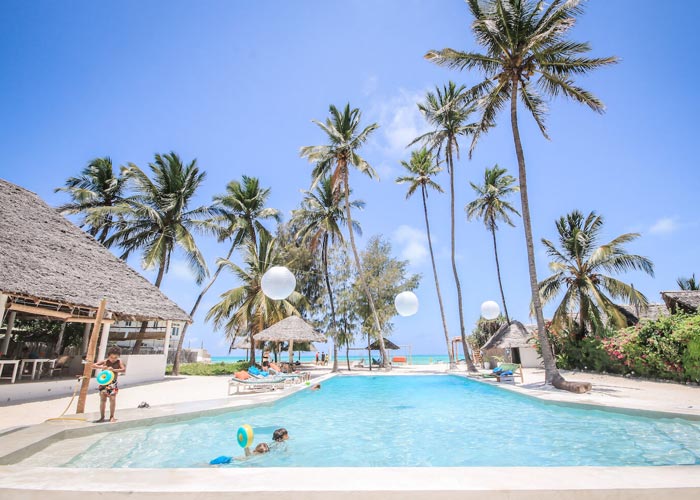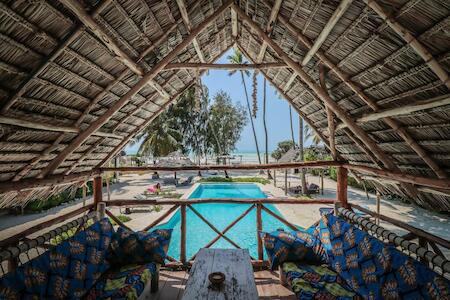Looking for budget stays in Zanzibar? This section is designed to save you time, money, and unnecessary stress. We've got insider tips to help you find affordable hostels and the cheapest places to stay in Zanzibar.

Zanzibar will not leave you disappointed -- the island is a perfect getaway from the dust of major East African cities, and a good place for diving and beach bumming.
Zanzibar, along with its neighboring islands, is an autonomous region of Tanzania; prepare your passport for stamping in and out at the harbor or airport. Zanzibar is famous for producing saffron, ginger, nutmeg, and other spices, and you even can take a spice tour around the plantations. The city also offers you a visit to the old Slave Market, where guides can tell you about this dark page of Zanzibar's history. Forodhani Gardens on the waterfront is a perfect place to visit at night for an evening snack at the market. Be sure to bring your bargaining skills!
Zanzibar's Stone Town is a World Heritage Site with a nice Arab feel to it -- there are narrow streets, lots of cats, and tons of dates sold at the market. Stone Town offers plenty of tour companies who can arrange your diving, kiteboarding, spice sampling, or boat trips around the island. For a more authentic experience, head to the rural parts of the coast, such as Jambiani Village in the southeast, to see seaweed plantations and fishing boats, sit on the beach, and enjoy the sun. Keep in mind that Zanzibar is a Muslim community, so dress and behave accordingly, especially when invited to local houses outside of main tourist areas.
Zanzibar's hostels and hotels are generally more expensive compared to the mainland, but the conditions are better, despite the occasional power shortages. You can also find some traditionally equipped Zanzibari guesthouses where local families will share their life with you.
Stone Town
Stone Town, Tanzania, is the old part of Zanzibar City on the semi-autonomous island of Zanzibar, and is hugely popular with tourists and travelers of every type. It is accessible by several daily ferries from Dar Es Salaam; the crossing takes about two hours.
The tiny alleys of Stone Town make for an intriguing wander; initially, travelers will get lost almost immediately. It's a maze of narrow streets, but heading toward the ocean will eventually get you reoriented. Watch out for motorbikes, though; the streets -- too narrow for cars -- are filled with motorbikes and cycles.
Stone Town has so much of interest to see -- it's mostly architectural, with a huge range of styles represented, which makes Stone Town a UNESCO World Heritage Site. Stone Town has been an immensely important port since the eighth century, and became a center of trade for spices and slaves during the nineteenth century. The architecture reflects the diversity of the people who traded here with examples of the original Swahili settlers and the Arab, Persian, Indian, and European traders who came here.
Stone Town's houses are characterized by ornately carved doorways, verandas with carved wooden balustrades, and long stone benches on the outside walls. Most of the major historical buildings can be found on the seafront with many former palaces, churches, mosques, and municipal buildings -- all made largely with coral stone, which gives the town its name. Among the most well-known and striking buildings are the Beit-Al-Ajaib (House of Wonders), The Old Fort, The Old Dispensary, and the Palace Museum. All of these are found on the seafront. Dotted around town are many small old mosques and churches.
As befitting a destination so popular with international tourists and travelers, Stone Town is loaded with accommodation choices. Most of the upmarket hotels are located in some of the oldest and most beautiful old houses in Stone Town. Budget travelers are well served by a small number of hostels in Stone Town, Tanzania. It helps to have detailed directions to get to these as the streets are difficult to navigate. Stone Town, Tanzania hostels all have dorm accommodation and are great sources of information for onward travel around the island of Zanzibar. There are a number of destinations around the island on the coast that also have hostel accommodation and recommendations are easily had in Stone Town, Tanzania hostels.
Zanzibar is an essential destination for travelers to Tanzania and you might find yourself extending you stay as you get caught up in the Stone Town atmosphere.
Paje
Paje, Tanzania, is a fishing village on the east coast of Zanzibar that is building a reputation as good beach stop for independent tourists. It is fifty kilometers east of Stone Town and at the crossroads of the east coast road that turns south, toward Jambiani and Makanduchi, and north to Bwejuu and Pingwe on the beautiful Michamvi Peninsula. Travel is cheap and easy on the local minibuses (dalla-dallas). The trip from Stone Town takes you past the Jozani forest, which is well worth a couple of hours on the walking trails. You might spot red colobus and Syke's monkeys, duikers, and bush babies.
Paje has long left its fishing village tranquillity behind, as more and more tourists arrive to enjoy its beautiful beach. It's now a prime spot for backpackers looking for a bit of a party scene. Further up the coast toward the tip of the Michamvi Peninsula, visitors will find much more peaceful spots. Kite-surfing is a big draw here, and there are a couple of places in Paje that will arrange this. December to June is kite-surfing season. There's also a dive center with snorkeling trips, too.
One of the focal points for travelers in Paje is Mr. Kahawa's coffee shop, right on the beach. Not only can you get snacks and drinks here, but it's also an outlet for the Jenga organization that gives an opportunity for local people to make and sell handicrafts. There is also a Seaweed Centre. The local villagers have long harvested seaweed here, and the centre now gives them the opportunity to sell their organic perfumes and soaps. Visitors can also take a tour of their workshops.
Accommodation in Paje is mostly geared toward backpackers, so you'll find plenty of Paje, Tanzania hostel dorm beds. Paje, Tanzania hostels are sociable places where backpackers from different countries, each with their own route, can meet and exchange ideas over a drink or two. The hostels in Paje, Tanzania, also help with arranging activities and onward travel. If you need to visit Stone Town, it's an easy minibus trip in under an hour. During kite-surfing season, accommodation is at a premium, so book ahead.
Written by Travel Expert Zanzibar
 Curly
Curly

